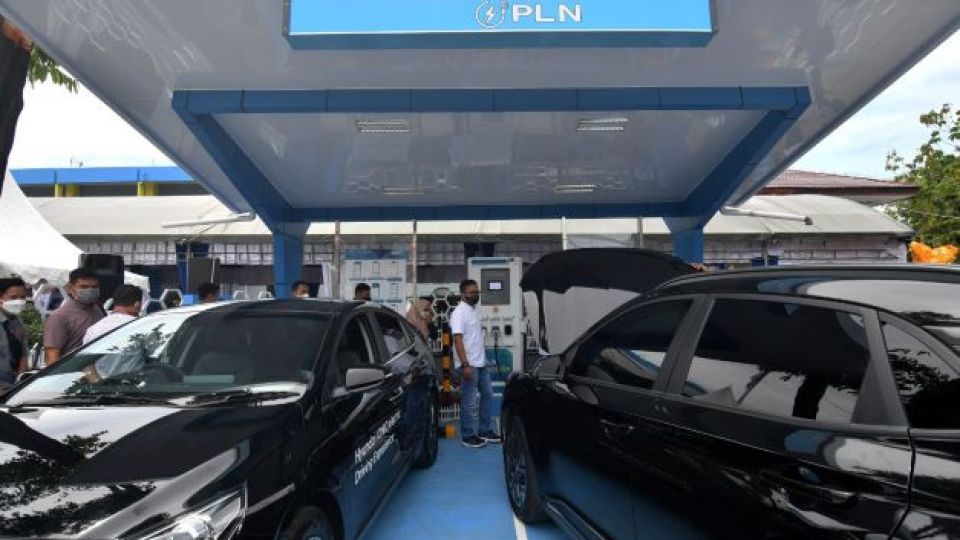September 15, 2022
JAKARTA – Electric vehicle producers in Indonesia are expecting drivers to switch to battery power as rising gasoline and diesel prices make combustion engines less appealing.
The prices of two subsidized fuel brands sold by state-owned oil giant Pertamina, RON-90 gasoline Pertalite and diesel fuel Solar, increased by more than 30 percent on Sept. 3 to Rp 10,000 and Rp 6,800 per liter, respectively.
Meanwhile, Pertamina’s RON 92 fuel Pertamax also saw a 16 percent increase to Rp 14,500 per liter last week, which followed a 40 percent increase in April.
The government defended the price hikes as a measure to prevent the subsidy budget from swelling out of control, but many warned the move would further stoke inflation, reduce popular purchasing power and put the targeted 5 percent GDP growth for this year out of reach.
Tenggono Chuandra Phoa, secretary-general of the Indonesian Electric Vehicle Industry Association (Periklindo), told The Jakarta Post on Monday that he was sure the nationwide fuel price hikes would prompt consumers to switch to battery-powered cars and motorcycles.
“With the hike in fuel prices, it’s certain that more people will use EVs,” Tenggono said, adding that daily running costs of EVs were roughly 80 percent below those of combustion engine vehicles.
He added that the government was also mulling over ways to restrict sales of subsidized fuel to owners of cars with engine capacities below 1,500 cc, which would force owners of more powerful cars, who are generally better off and hence deemed ineligible for subsidies, to switch to more expensive high-octane fuel.
EV owners, by contrast, could charge their vehicles at affordable electricity prices, whether at home or at public charging stations, he said, adding that EV users also benefited from lower maintenance costs, as components were simpler and did not require lubricants.
The transition to electric vehicles is an important part of Indonesia’s overall EV road map, and the government has invited major carmakers to produce EVs in the country, which holds some of the world’s largest reserves of nickel, a key metal for the production of batteries.
A central player in that plan is the Indonesia Battery Corporation (IBC), a consortium formed by four major state-owned enterprises with the goal of making Indonesia a heavyweight in global EV supply chains.
IBC CEO Toto Nugroho said EVs offered consumers significant savings by eliminating fuel purchases alone.
Based on IBC studies, EVs afford motorists a 35 percent reduction in daily expenses compared to the average costs of operating combustion-based four-wheelers, while in two-wheelers, the switch to EV could slash costs by between 25 and 30 percent.
“With this transition, we can save large sums of [money],” Toto told the Post on Monday after a meeting at the House of Representatives, adding that the government itself was in the process of switching to EVs to cut costs.
The transition to EVs would also allow the country to reduce its fuel imports significantly, he said, estimating that if 30 percent of all vehicles in Indonesia were replaced with EVs, imports could drop by 30 million barrels annually.
“If the conversion rate was higher, we could cut fuel imports even more,” Toto said.
IBC has set a target for Indonesia to have at least 600,000 four-wheeler EVs and between 3 million and 4 million two-wheeler EVs on the road by 2035.
Abrar Aulia, an analyst for the textile, automotive and steel industries at state-owned lender Bank Mandiri, told the Post on Monday that the hike in fuel prices would indeed expedite the switch to EVs, albeit on a limited scale.
“[The transition] to EVs would be mostly from high-income consumers, who account for less than a fifth of vehicle owners. Why? Because car sales in Indonesia are dominated by cars that cost less than Rp 300 million,” Abrar said.
Most EV cars costs more than Rp 700 million, with some priced far above the Rp 1 billion mark.
He explained that the battery, generally the costliest component in an EV, was still prohibitively expensive. Even though some plants had started to produce batteries locally, it would take time before their cost could come down far enough to make them affordable to a sizeable population.
Some producers, he said, were having trouble meeting demand as EVs tended to be more sophisticated and hence required more semiconductors, which were hard to come by globally right now.
Indonesia also still needed to provide more charging stations, he said.
According to state-owned electricity monopoly PLN, there are currently only 129 public charging stations across the country, which so far serve only 38 cities.


